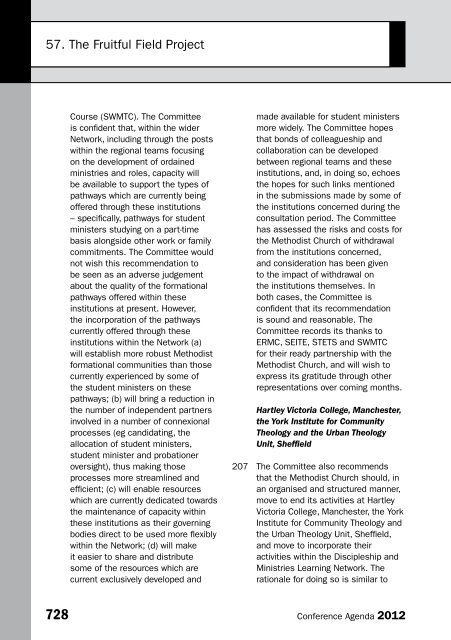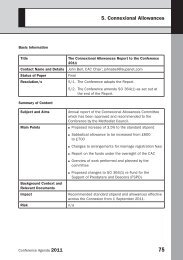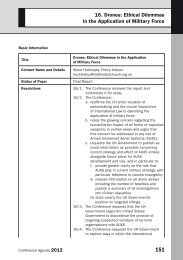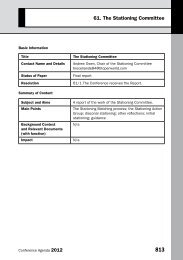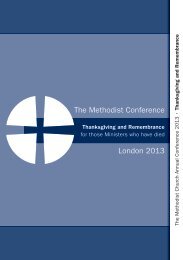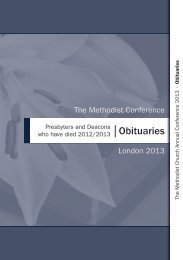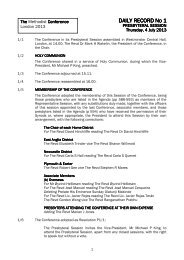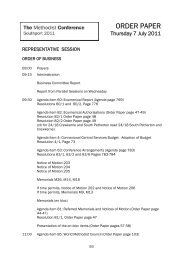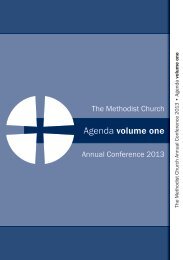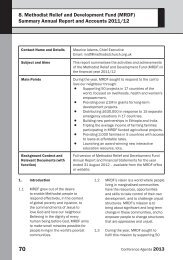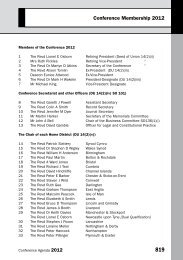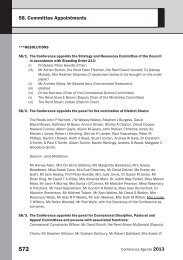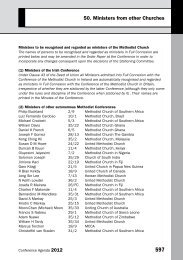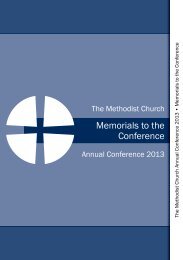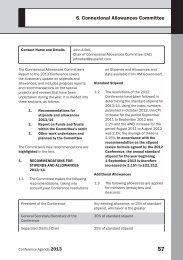Agenda Volume 3 - Methodist Conference
Agenda Volume 3 - Methodist Conference
Agenda Volume 3 - Methodist Conference
You also want an ePaper? Increase the reach of your titles
YUMPU automatically turns print PDFs into web optimized ePapers that Google loves.
57. The Fruitful Field Project<br />
Course (SWMTC). The Committee<br />
is confident that, within the wider<br />
Network, including through the posts<br />
within the regional teams focusing<br />
on the development of ordained<br />
ministries and roles, capacity will<br />
be available to support the types of<br />
pathways which are currently being<br />
offered through these institutions<br />
– specifically, pathways for student<br />
ministers studying on a part-time<br />
basis alongside other work or family<br />
commitments. The Committee would<br />
not wish this recommendation to<br />
be seen as an adverse judgement<br />
about the quality of the formational<br />
pathways offered within these<br />
institutions at present. However,<br />
the incorporation of the pathways<br />
currently offered through these<br />
institutions within the Network (a)<br />
will establish more robust <strong>Methodist</strong><br />
formational communities than those<br />
currently experienced by some of<br />
the student ministers on these<br />
pathways; (b) will bring a reduction in<br />
the number of independent partners<br />
involved in a number of connexional<br />
processes (eg candidating, the<br />
allocation of student ministers,<br />
student minister and probationer<br />
oversight), thus making those<br />
processes more streamlined and<br />
efficient; (c) will enable resources<br />
which are currently dedicated towards<br />
the maintenance of capacity within<br />
these institutions as their governing<br />
bodies direct to be used more flexibly<br />
within the Network; (d) will make<br />
it easier to share and distribute<br />
some of the resources which are<br />
current exclusively developed and<br />
made available for student ministers<br />
more widely. The Committee hopes<br />
that bonds of colleagueship and<br />
collaboration can be developed<br />
between regional teams and these<br />
institutions, and, in doing so, echoes<br />
the hopes for such links mentioned<br />
in the submissions made by some of<br />
the institutions concerned during the<br />
consultation period. The Committee<br />
has assessed the risks and costs for<br />
the <strong>Methodist</strong> Church of withdrawal<br />
from the institutions concerned,<br />
and consideration has been given<br />
to the impact of withdrawal on<br />
the institutions themselves. In<br />
both cases, the Committee is<br />
confident that its recommendation<br />
is sound and reasonable. The<br />
Committee records its thanks to<br />
ERMC, SEITE, STETS and SWMTC<br />
for their ready partnership with the<br />
<strong>Methodist</strong> Church, and will wish to<br />
express its gratitude through other<br />
representations over coming months.<br />
Hartley Victoria College, Manchester,<br />
the York Institute for Community<br />
Theology and the Urban Theology<br />
Unit, Sheffield<br />
207 The Committee also recommends<br />
that the <strong>Methodist</strong> Church should, in<br />
an organised and structured manner,<br />
move to end its activities at Hartley<br />
Victoria College, Manchester, the York<br />
Institute for Community Theology and<br />
the Urban Theology Unit, Sheffield,<br />
and move to incorporate their<br />
activities within the Discipleship and<br />
Ministries Learning Network. The<br />
rationale for doing so is similar to<br />
728 <strong>Conference</strong> <strong>Agenda</strong> 2012


